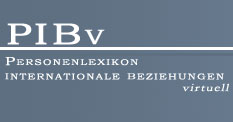Nye, Joseph S. Jr.
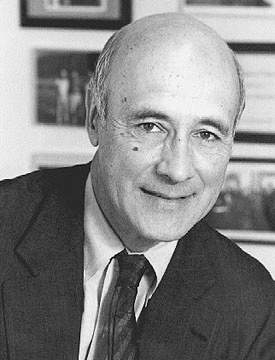
Joseph Samuel Nye, Junior
US-amerikanischer Politikwissenschaftler, mit Robert Keohane Begründer des neoliberalen Institutionalismus (Interdependenztheorie), ihr Hauptwerk „Power and Interdependence“ sollte Morgenthaus „Politics Among Nations“ als neues Standardwerk der IB ablösen.
Berater der US-Regierung und ehemaliger Mitarbeiter im US-Außenministerium, Stellvertretender Verteidigungsminister der Clinton-Administration
* 19.01.1937 in South Orange, New Jersey, USA
† 6.5.2025 in Cambridge, Mass.
Werdegang
1958 BA in Public Affairs an der Princeton University
1960 BA in Philosophie, Politik und Wirtschaftswissenschaften an der Harvard University
1964 Promotion an der Harvard University
1964-1977 Instructor, später Professor an der Harvard University
1977-1979 Stellvertretender Staatssekretär im amerikanischen Außenministerium für Sicherheit, Wissenschaft und Technik
1979-1985 Professor an der Harvard University
1985-1990 Direktor des Center for Science and International Affairs der Kennedy School of Government an der Harvard University
1989-1992 Stellvertretender Dekan für International Affairs an der Harvard University
1989-1993 Clarence Dillon Professor of International Affairs und zugleich Direktor des Center for International Affairs an der Harvard University
1993-1994 Vorsitzender des National Intelligence Council
1994-1995 Stellvertretender Verteidigungsminister der USA
seit 1995 Dekan der Kennedy School of Government der Harvard University
Gastaufenthalte
1968 Visiting Professor der Carnegie Endowment for International Peace am Institut Universitaire des Hautes Etudes Internationales, Genf
1973 Visiting Professor an der School of International Affairs der Carleton University, Ottawa
1974 Visiting Fellow am Royal Institute of International Affairs, London
1989 Visiting Scholar am St. Antony's College der Oxford University
1990 Montague Burton Professorship an der University of Edinburgh
1993 Fellow am Woodrow Wilson International Center, Washington, D.C.
Auszeichnungen
1958 Herrick Thesis Prize und Rhodes Scholar
1964 Summer Thesis Prize der Ford Foundation Area Training Fellowship
1979 Department of State Distinguished Honor Award
1994 Intelligence Community Distinguished Service Medal
1995 Department of Defense Distinguished Service Medal with Oak Leaf Cluster
1996 Ehrenmitglied des Exeter College der Oxford University
Mitgliedschaften
American Academy of Arts and Sciences
American Academy of Diplomacy
American Council on Germany (Board of Directors 1985-1993)
American Political Science Association
American Society of International Law
Aspen Institute for Humanistic Studies
Atlantic Institute for International Affairs (Board of Governors 1974-1977)
Carnegie Endowment for International Peace
Council on Foreign Relations
Institute for East-West Security Studies
International Institute for Strategic Studies (Governing Council 1985-1993)
National Academy of Sciences
Trilateral Commission
United Nations Advisory Board on Disarmament Matters (1989-1993)
United Nations Association (Board of Directors 1973-1993)
World Peace Foundation
Defense Policy (Editorial Board 1996-2001)
Foreign Policy (Editorial Board 1970-1976 und seit 1979)
International Organization (Board of Editors 1968-1986, Chairman 1972-1974)
International Security (Editorial Board seit 1979, Chairman 1985-1990)
Review of International Studies (Editorial Board seit 1989)
Publikationen
Bücher
Pan Africanism and East African Integration. Cambridge: Harvard University Press 1965.
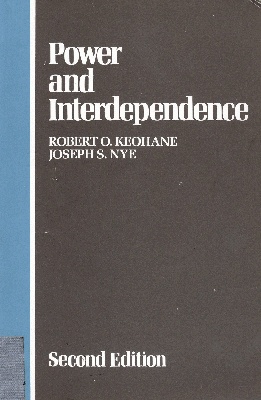
Peace in Parts: Integration and Conflict in Regional Organization. Boston: Little Brown and Company 1971.
mit Robert O. Keohane
Power and Interdependence: World Politics in Transition. Boston: Little Brown and Company 1977.
(zweite erw. Aufl. New York: Harper Collins 1989; dritte nochmals erw. Aufl: New York: Longman 2000)
Living with Nuclear Weapons: A Report by the Harvard Nuclear Study Group. Cambridge: Harvard University Press 1983.
mit Graham Allison and Albert Carnesale
Hawks, Doves and Owls: An Agenda for Avoiding Nuclear War. New York: Norton 1985.
Nuclear Ethics. New York: The Free Press 1986.
Bound to Lead: The Changing Nature of American Power. New York: Basic Books 1990.
mit Kurt Biedenkopf und Motoo Shiina
Global Competition After the Cold War: A Reassessment of Trilateralism. New York: The Trilateral Commission 1991.
(dtsch.: Globale Kooperation nach dem Ende des Kalten Krieges. Eine Neueinschätzung des Trilateralismus. Bonn: Forschungsinstitut der Deutschen Gesellschaft für Auswärtige Politik 1992.)
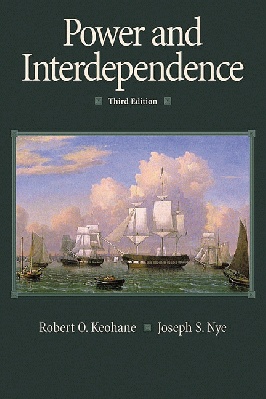 Understanding International Conflicts: An Introduction to Theory and History. New York: Longman 2002.
Understanding International Conflicts: An Introduction to Theory and History. New York: Longman 2002.
(7. Aufl. New York: Pearson Longman 2007)
The Paradox of American Power: Why the World’s Only Superpower Can’t Go it Alone. New York: Oxford University Press 2002. (dt.: Das Paradox der amerikanischen Macht. Warum die einzige Supermacht der Welt Verbündete braucht. Hamburg: Europäische Verlagsanstalt 2003.)
mit Yukio Satoh und Paul Wilkinson
Addressing the New International Terrorism: Prevention, Intervention, and Multilateral Cooperation. Washington, D.C.: The Trilateral Commission 2003.
mit Jessica Einhorn, Béla Kádár u.a.
The 'Democracy Deficit' in the Global Economy: Enhancing the Legitimacy and Accountability of Global Institutions. Washington, D.C.: Trilateral Commission 2003.
Soft Power: The Means to Success in World Politics. New York: Public Affairs 2004.
Power in the Global Information Age. London: Routledge, 2004.
mit David A. Welch
Understanding Global Conflict and Cooperation. An Introduction to Theory and History. Upper Saddle River, NJ: Pearson 2009.
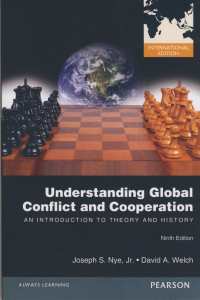
The Future of Power. New York: Public Affairs 2011 (deutsch: Macht im 21. Jahrhundert. Politische Strategien für ein neues Zeitalter. München: Siegler 2011).
Herausgeberschaften
International Regionalism. Boston: Little Brown and Company 1968.
mit Robert O. Keohane
Transnational Relations and World Politics. Cambridge: Harvard University Press 1970.
mit Ernst B. Haas und Robert L. Butterworth
Conflict Management by International Organizations. Morristown: General Learning Press 1972.
Nuclear Power Issues and Choices: A Report of the Nuclear Energy Policy Study Group. Cambridge: Ballinger Publishing Company 1977.
mit David A. Deese
Energy and Security. Cambridge: Ballinger Publishing Company 1980.
The Making of America's Soviet Policy. New Haven: Yale University Press 1984.
mit Samuel Huntington
Global Dilemmas. Lanham: University Press of America 1985.
mit James A. Schear Jr.
Seeking Stability in Space: Anti-Satellite Weapons and the Evolving Space Regime. Lanham: The Aspen Institute for Humanistic Studies 1987.
mit James A. Schear Jr.
On the Defensive? The Future of SDI. Lanham: The Aspen Strategy Group 1988.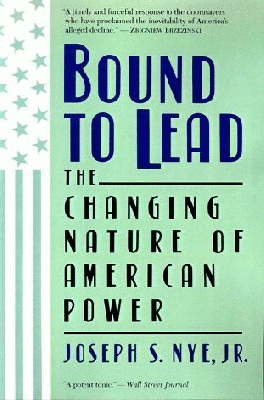
mit Graham T. Allison und Albert Carnesale
Fateful Visions: Avoiding Nuclear Catastrophe. Cambridge: Ballinger Publishing Company 1988.
mit Roger K. Smith
After the Storm: Lessons from the Gulf War. Lanham: Madison Books 1992.
mit Robert O. Keohane und Stanley Hoffmann
After the Cold War: International Institutions and State Strategies in Europe, 1989-1991. Cambridge, Mass.: Harvard University Press 1993.
mit Philip D. Zelikow and David C. King
Why People Don’t Trust Government. Cambridge: Harvard University Press 1997.
mit Elaine Ciulla Kamarck
democracy.com? Governance in A Networked World. Hollis: Hollis Publishing 1999.
mit John D. Donahue
Governance in a Globalizing World. Washington, D.C.: Brookings Institution Press 2000.
mit John D. Donahue
Market-Based Governance: Supply Side, Demand Side, Upside, and Downside. Washington, D.C.: Brookings Institution Press 2002.
Aufsätze
East African Economic Integration. In: Journal of Modern African Studies 1.1963, 4. S. 475-502.
Patterns and Catalysts in Regional Integration. In: International Organization 19.1965, 3. S 870-884.
Comparative Regional Integration: Concept and Measurement. In: International Organization 22.1968, 4. S. 855-880.
United States Policy Toward Regional Organization. In: International Organization 23.1969, 3. S. 719-740.
Comparing Common Markets: A Revised Neo-Functionalist Model. In: International Organization 24.1970, 3. S. 796-835.
mit Robert Keohane
Transnational Relations and World Politics: An Introduction. In: International Organization 25.1971, 3. S. 329-349.
mit Robert Keohane
Transnational Relations and World Politics: A Conclusion. In: International Organization 25.1971, 3. S. 721-748.
The Future of Regional Institutions. In: Black, Cyril/Falk, Richard (Hrsg.): The Future of International Legal Order Vol. IV. Princeton: Princeton University Press 1972.
Collective Economic Security. In: International Affairs 50.1974, 4. S. 584-598.
mit Robert O. Keohane
International Interdependence and Integration. In: Greenstein, Fred/Polsby, Nelson (Hrsg.): The Handbook of Political Science. Reading: Addison-Wesley 1974.
mit Robert O. Keohane
World Politics and the International Economic System. In: Bergstein, Fred (Hrsg.): The Future of the International Economic Order.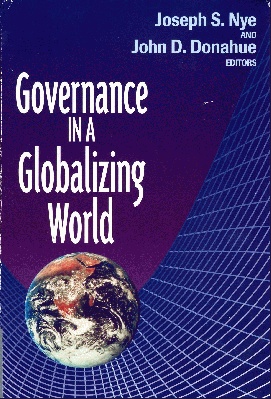 Lexington: D.C. Heath and Co. 1973.
Lexington: D.C. Heath and Co. 1973.
UNCTAD: Poor Nations' Pressure Group. In: Cox, Robert/Jacobsen, Harold (Hrsg.): The Anatomy of Influence: Decision Making in International Organizations. New Haven: Yale University Press 1973.
Transnational Relations and Interstate Conflicts: An Empirical Analysis. In: International Organization 28.1974, 4. S. 961-996.
mit Robert O. Keohane
Introduction: The Complex Politics of Canadian-American Interdependence. In: International Organization 28.1974, 4. S. 595-607.
mit Robert O. Keohane
Transgovernmental Relations and International Organizations. In: World Politics 27.1974, 1. S. 39-62.
mit Lawrence B. Krause
Reflections on the Economics and Politics of International Economic Organizations. In: International Organization 29.1975, 1. S. 323-342.
mit C. Fred Bergsten und Robert O. Keohane
International Economics and International Politics: A Framework for Analysis. In: International Organization 29.1975, 1. S. 3-36.
Ocean Rule Making from a World Politics Perspective. In: Ocean Development and International Law Journal 3.1975, 1.
Independence and Interdependence . In: Foreign Policy Nr. 22, 1976. S. 130-161.
mit Christopher J. Makins
Interdependence: The European Example. In: Foreign Policy Nr. 24, 1976. S. 139-144.
Non-Proliferation: A Long Term Strategy. In: Foreign Affairs 56.1978, 3. S. 601-623.
Energy Nightmares. In: Foreign Policy Nr. 40, 1980. S. 132-154.
mit Robert J. Art
To What Ends Military Power? In: International Security 5.1980, 2. S. 187-190.
Maintaining a Nonproliferation Regime. In: International Organization 35.1981, 1. S. 15-38.
The U. S. and Soviet Stakes in Nuclear Nonproliferation. In: PS Political Science 15.1982, 1. S. 32-39.
Restarting Arms Control. In: Foreign Policy Nr. 47, 1982. S. 98-113.
Energy and Security Strategy. In: Huntington, Samuel (Hrsg.): The Strategic Imperative: New Policies for American Security. Cambridge: Ballinger Publishing Company 1982.
Political Lessons of the New Law of the Sea Regime. In: Oxman, Bernard (Hrsg.): Law of the Sea: U.S. Policy Dilemmas. California: ICS Press 1983.
U.S.-Soviet Relations and Nuclear-Risk Reduction. In: Political Science Quarterly 99.1984, 3. S. 401-414.
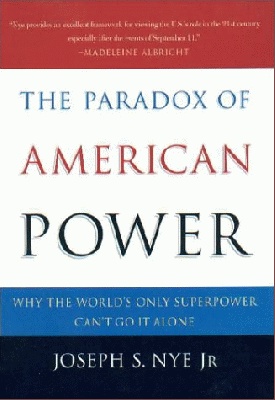 NPT: The Logic of Inequality. In: Foreign Policy Nr. 59, 1985. S. 123-131.
NPT: The Logic of Inequality. In: Foreign Policy Nr. 59, 1985. S. 123-131.
mit Robert O. Keohane
Two Cheers for Multilateralism. In: Foreign Policy Nr. 60, 1985. S. 148-167.
mit Graham T. Allison und Albert Carnesale
Hawks, Doves and Owls: A New Perspective on Avoiding Nuclear War. In: International Affairs 61.1985, 4. S. 581-589.
Nuclear Risk Reduction Measures and U.S.-Soviet Relations. In: Blechman, Barry (Hrsg.): Preventing Nuclear War. Bloomington: Indiana University Press 1985.
mit Richard Cooper
Ethics and Foreign Policy. In: Huntington, Samuel/Nye, Joseph (Hrsg.): Global Dilemmas. Cambridge, MA: Center for International Affairs, Harvard University 1985.
Farewell to Arms Control? In: Foreign Affairs 65.1986, 1. S. 1-20.
The Diplomacy of Nuclear Nonproliferation. In: Henrikson, Alan (Hrsg.): Negotiating World Order: The Artisanship and Architecture of Global Diplomacy. Wilmington, DE: Scholarly Resources Inc. 1986.
Ethics and the Nuclear Future. In: The World Today 42.1986, 8-9. S. 151-154.
mit Graham T. Allison und Albert Carnesale
The Owl's Agenda for Avoiding Nuclear War. In: The Washington Quartely 9.1986, 3. S. 45-58.
Nuclear Learning and U.S.-Soviet Security Regimes. In: International Organization 41.1987, 3. S. 371-402. 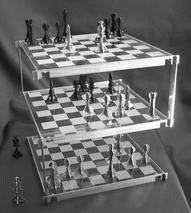
mit Robert O. Keohane
Power and Interdependence Revisited. In: International Organization 41.1987, 4. S. 725-753.
mit James G. Blight und David A. Welch
The Cuban Missile Crisis Revisited. In: Foreign Affairs 66.1987, 1. S. 170-188.
The Superpowers and the Non-Proliferation Treaty. In: Carnesale, Albert/Haass, Richard (Hrsg.): Superpower Arms Control: Setting the Record Straight. Cambridge: Ballinger Publishing Company 1987.
mit William J. Perry, Brent Scowroft und James A. Schear
How to Proceed with SDI-Realistic Priorities. In: The National Interest Nr. 7, 1987.
Superpower Ethics: An Introduction. In: Ethics and International Affairs 1.1987, 1. S. 1-7.
Ethics and American Foreign Policy. In: Myers, Robert J. (Hrsg.): International Ethics in the Nuclear Age. Lanham: University Press of America 1987.
Old Wars and Future Wars: Causation and Prevention. In: Journal of Interdisciplinary History 18.1988, 4. S. 581-590.
mit Sean M. Lynn-Jones
International Security Studies: A Report of a Conference on the State of the Field. In: International Security 12.1988, 4. S. 5-27.
Understanding U. S. Strength. In: Foreign Policy Nr. 72, 1988. S. 105-129.
Short-Term Folly, Not Long-Term Decline. In: New Perspectives Quarterly 5.1988, 2.
Gorbachev's Russia and U.S. Options. In: Bialer, Seweryn/Mandelbaum, Michael (Hrsg.): Gorbachev's Russia and American Foreign Policy. Boulder: Westview Press 1988.
Neorealism and Neoliberalism. In: World Politics 40.1988, 2. S. 235-251.
Reducing Nuclear Weapons. In: Scowcroft, Brent/Woolsey, James/Etzold, Thomas (Hrsg.): Defending Peace and Freedom: Towards Strategic Stability in the Year 2000. Lanham: University Press of America 1988.
Arms Control After the Cold War. In: Foreign Affairs 68.1989, 5. S. 42-64.
Die Debatte über den Niedergang der Vereinigten Staaten. In: Europa Archiv 45.1990, 13-14. S. 421-427.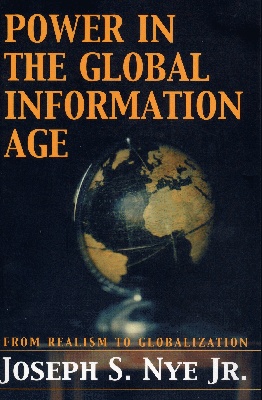
American Strategy after Bipolarity. In: International Affairs 66.1990, 3. S. 513-521.
The Changing Nature of World Power. In: Political Science Quarterly 105.1990, 2. S. 177-192.
Soft Power. In: Foreign Policy No. 80, 1990. S. 153-171.
What New World Order? In: Foreign Affairs 71.1992, 2. S. 83-96.
Coping with Japan. In: Foreign Policy Nr. 89, 1992. S. 96-115.
Peering Into the Future. In: Foreign Affairs 73.1994, 2. S. 82-93.
Conflicts After the Cold War. In: The Washington Quarterly 19.1996, 1. S. 5-24.
America's Information Edge. In: Foreign Affairs 75.1996, 2. S. 20-36.
In Government We Don't Trust. In: Foreign Policy Nr. 108, 1997. S. 99-111.
China’s Re-emergence and the Future of the Asia-Pacific. In: Survival 34.1997, 4. S. 65-79
mit Robert O. Keohane
Power and Interdependence in the Information Age. In: Foreign Affairs 77.1998, 5. S. 81-94.
Redefining the National Interest. In Foreign Affairs 78.1999, 4. S. 22-35.
The US and Europe: Continental Drift? In: International Affairs 76.2000, 1. S. 51-59.
Asia's First Globalizer. In: The Washington Quarterly 23.2000, 4. S. 121-124.
mit Robert O. Keohane
Globalization: What's New? What's Not? (And So What?). In: Foreign Policy Nr. 118, 2000. S. 104-119.
mit Robert O. Keohane
The Club Model of Multilateral Cooperation and Problems of Democratic Legitimacy. In: Porter, Roger (Hrsg.): Efficiency, Equity, and Legitimacy: The Multilateral Trading System at the Millennium. Washington, DC : Brookings Institution Press 2001. S. 264-294.
The Dependent Colossus. In: Foreign Policy Nr. 129, 2002. S. 74-76.
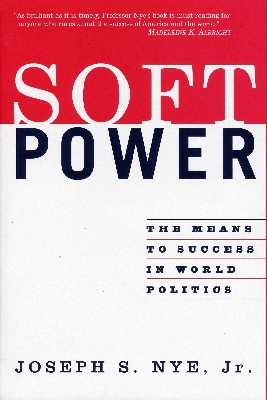 The Velvet Hegemon. In: Foreign Policy Nr. 136, 2003. S. 74-75.
The Velvet Hegemon. In: Foreign Policy Nr. 136, 2003. S. 74-75.
Limits of American Power. In: Political Science Quarterly 117.2002.4. S. 545-559.
The New Rome Meets the New Barbarians. In: The Economist 21.03.2002.
U.S. Power and Strategy After Iraq. In: Foreign Affairs 82.2003, 4. S. 60-73.
Amerikas Macht. In: Speck, Ulrich/Sznaider, Natan (Hrsg.): Empire Amerika. Perspektiven einer neuen Weltordnung. München: Deutsche Verlags-Anstalt 2003. S. 156-172.
The Decline of America’s Soft Power: Why Washington Should Worry. In: Foreign Affairs 83.2004, 3. S. 16-20.
Soft Power and American Foreign Policy. In: Political Science Quarterly 119.2004, 2. S. 255-270
On the Rise and Fall of American Soft Power In: New Perspectives Quarterly 22.2005, 3. S. 75-77.
Autobiographie
Studying World Politics. In: Kruzel, Joseph/Rosenau, James (Hrsg.): Journeys Through World Politics: Autobiographical Reflections of Thirty-four Academic Travelers. Lexington: Lexington Books 1989. S. 199.
Sekundärliteratur
Lehmkuhl, Ursula: Robert O. Keohane/Joseph S. Nye, Jr. In: Bleek, Wilhelm/Lietzmann, Hans J. (Hrsg): Klassiker der Politikwissenschaft. Von Aristoteles bis David Easton. München: C.H. Beck 2005. S. 303-318.
Little, Richard: Power and Interdependence: A Realist Critique. In: Jones, R.J. Barry/Willets, Peter (Hrsg.): Interdepence on Trial: Studies in the Theory and Reality of Contemporary Interdependence. London: Pinter 1984. S. 111-129.
Menzel, Ulrich/Varga, Katharina: Theorie und Geschichte der Lehre von den Internationalen Beziehungen. Einführung und systematische Bibliographie. Hamburg: Deutsches Übersee Institut 1999. S. 320-323.
Weblinks
Persönliche Seite an der Harvard University
Online verfügbare Artikel von Joseph Nye
Interview mit Joseph Nye bei „Conversation with History“ an der University of California Berkely
Interview mit Jospeh Nye und Richard Armitage am Center for Strategic and International Studies (CSIS)
HN
